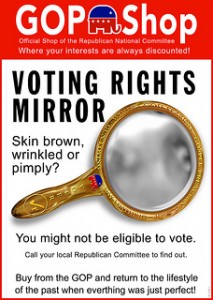Controversial Texas ‘Voter ID’ Law Argued In Federal Court
 By Raisa Camargo, Voxxi
By Raisa Camargo, Voxxi
Washington, D.C. — A voter ID law in Texas upheld by Republicans last year is expected to carry long-lasting political implications — no matter which side the federal court rules.
Arguments are being heard this week in federal court in the nation’s capitol on whether the U.S. Justice Department has the legal authority to overrule Texas’ controversial voter ID law, which requires voters to present only specific forms of photo I.D. to cast a ballot.
In a highly competitive election season, Democrats charge that Republicans want to circumvent the Voting Rights Act by passing laws in key swing states making it more difficult for Latinos and African Americans to vote. They say it is no coincidence that states that have already cut back on voting rights will provide 171 electoral votes in 2012 – 63 percent of the 270 needed to win the presidency — according to a report by the Brennan Center for Justice.
Rep. Charlie Gonzalez (D-Texas) told VOXXI that he expects this challenge will be taken all they way to the U.S. Supreme Court.
“They want to find a way to rule on the constitutionality of section five,” said Gonzalez, speaking of Republican legislators. “Never bet on how a judge or jury will come back. We’re going to be prepared.”
Section five of the Voting Rights Act requires states to seek pre-clearance before enacting voting laws. Texas has to have federal pre-clearance before implementing redistricting maps because of the state’s history of discriminating against voters.
Gonzalez explained that on behalf of the Congressional Hispanic Caucus they will continue to work with civil rights organizations including the Mexican American Legal Defense Fund (MALDEF) to track and provide sufficient proof that people are disenfranchised from their right to vote.
Texas Rep. Trey Martinez Fischer, chairman of the Mexican American Legislative Caucus (MALC), said that this law could have a “chilling effect at the polls.”
Latinos in Texas make up 38 percent of the population.
“We’re beginning to learn that the harder it is to get to these communities, then the more likelihood that people don’t have the requisite documents,” Fischer said. “For one, they don’t have the license to begin with. Number two: Many of these people are born in their homes, on their farms and not in hospitals. Many of these people don’t have birth certificates.”
Counter arguments were heard during trial. There was some confusion on the exact number of people the photo ID law would impact.
The Texas photo ID law is considered one of the strictest among the 17 states that have tried to implement similar legislation. One point of contention is that the Texas law allows voters to use a concealed handgun licenses as proof of identity, but doesn’t allow voters to use a student ID, even if it was issued by a state university.
Elizabeth Westfall, a lawyer of the Justice Department related in her opening statements yesterday that as many as 1.4 million voters lack any form of acceptable identification under Texas’ new law, according to the Associated Press. An AP review of temporary ballots from Indiana and Georgia — the states which first adopted the most stringent laws — found that more than 1,200 votes that should have been valid were tossed in the 2008 general election because of such voter identification standards.
Republicans on Texas’ side counter that it prevents against voter fraud. Brian Keith Ingram, an official with the Texas Secretary of State’s Office, said during opening arguments yesterday that he knew of four instances where someone who “voted” had recently passed away. He said there could be as many as 239 such cases come out during the trial, which is being heard by a three-judge panel.
The case is also the first challenge against Attorney General Eric Holder’s move to block states from enacting similar legislation. Two laws were passed in Georgia and Indiana with voter ID restrictions. Both were upheld by state courts. But Rep. Fischer, of Texas, said no evidence of disenfranchisement were shown during trial.
The trial over the Texas law is expected to last through the end of the week. Closing arguments will occur on July 13. Ezra D. Rosenberg of Dechert LLP, counsel for Texas NAACP and MALC, will give the closing argument on behalf of the organizations and individuals who have intervened in the case to oppose pre-clearance.
And if the court rules in favor of Texas, critics say it might create more leeway for states to redraw maps that indirectly burden minority communities.
“Texas’ photo ID law could prevent hundreds of thousands of eligible voters from casting a ballot, including a disproportionate number of minorities,” said Wendy Weiser, Director of the Democracy Program at the Brennan Center.
Bob Kengle, co-director of the Voting Rights Project, added that it blocks a majority of Latinos from voting in November.
This article was first published in Voxxi.
Raisa Camargo is a staff writer at Voxxi.
[Photo by DonkeyHotey]
